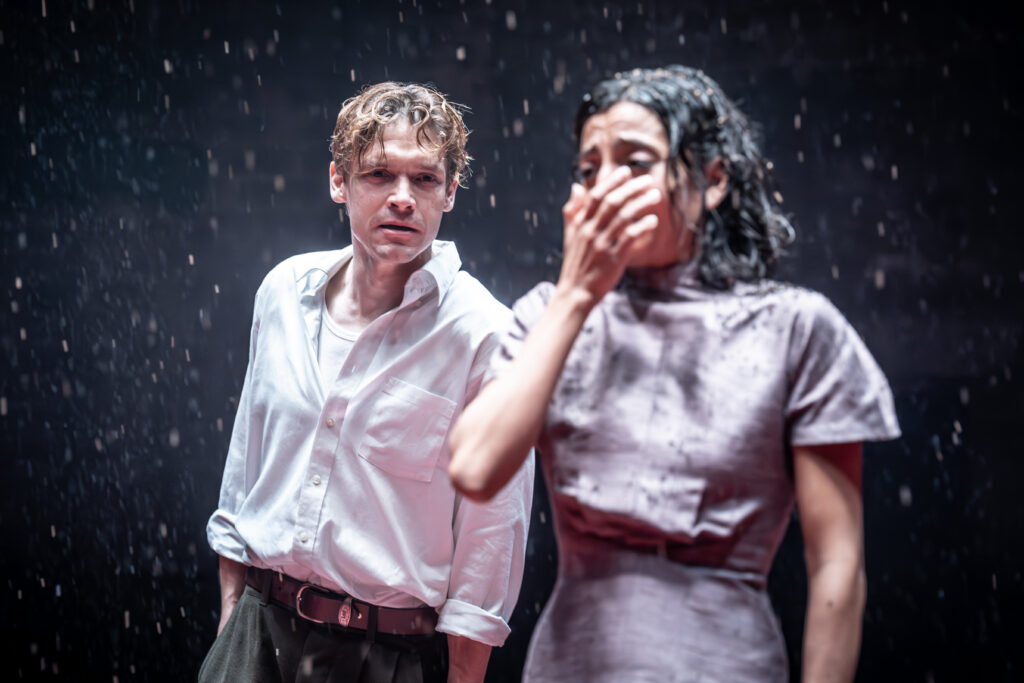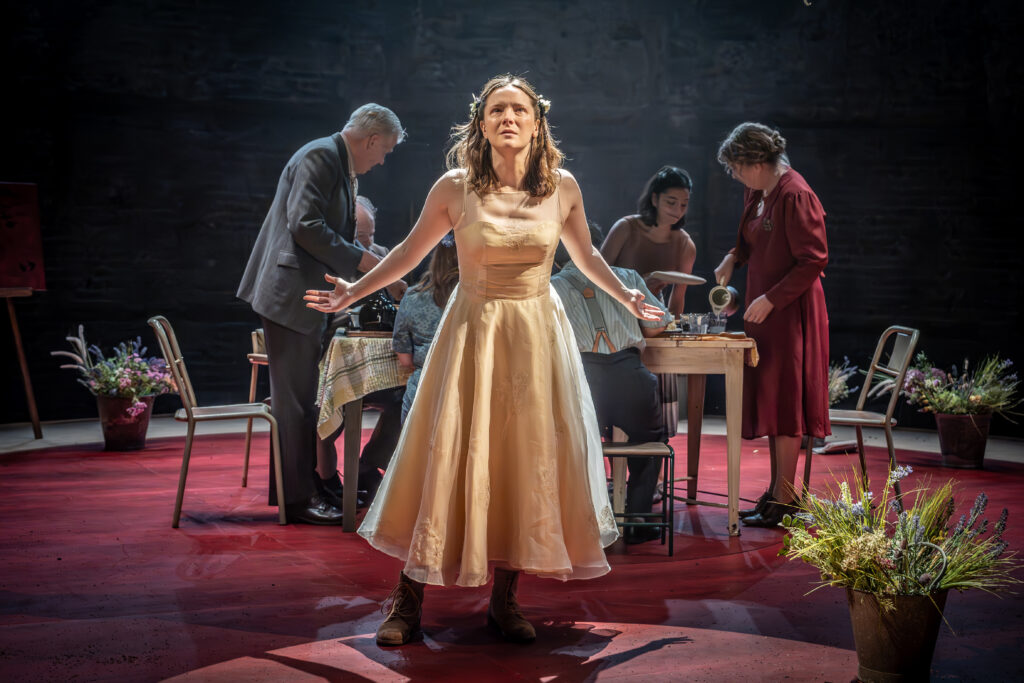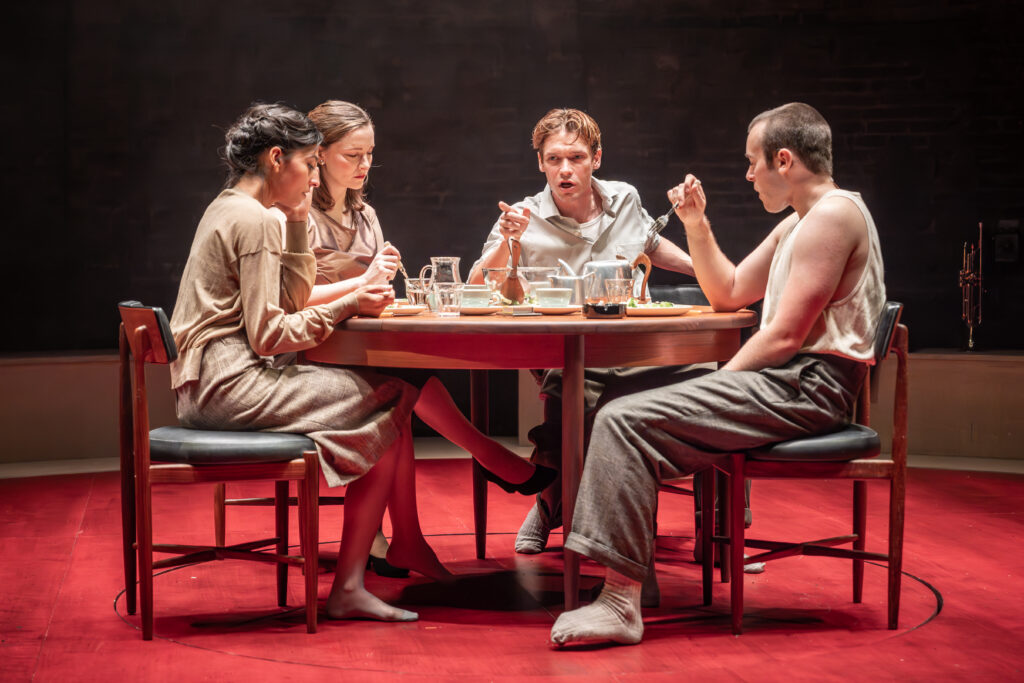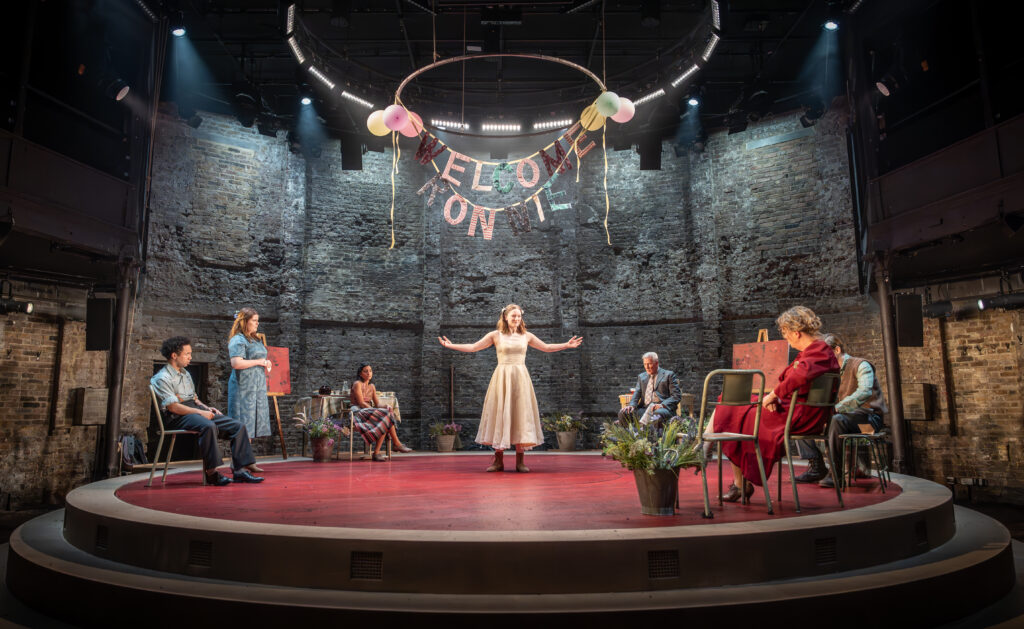
The Almeida’s Young and Angry season offers a one-two of John Osborne’s Look Back in Anger (★★★★★) and Arnold Wesker‘s Roots (★★★☆☆) – two kitchen-sink dramas (even if the former is more iron boarding than sink) of the late-1950s that made their London debuts within a few years of each other on the other side of London at the Royal Court Theatre.
Look Back in Anger sparked the Angry Young Man movement but Wesker‘s Roots features an angry young woman at its centre in the form of its heroine Beattie Bryant (Morfydd Clark) who has returned home to Norfolk from London with new ideas about life as she prepares to introduce them to her boyfriend of three years, Ronnie, bringing his socialist ideals with her. In Look Back in Anger, the working-class Jimmy Porter (Billy Howle) is living in a rented Midlands flat with his upper-middle-class wife Alison (Ellora Torchia) and Cliff (Iwan Davies) – lodger, business partner, friend and peacemaker – as he rages against the world he has been born into.

Neither play is staged with kitchen-sink realism. Instead, the action plays out on Naomi Dawson’s modern, minimalist set; a raised round platform with a blood-red floor. In Roots, inactive cast members who loiter around the theatre’s stone walls provide or remove props as required as the platform almost unnoticeably revolves. In Look Back in Anger, the platform is now mostly static with the props shelved at the back of the stage.
The obvious questions arise almost seventy years – are these plays dated? Are they relevant? They were written as the Conservative Prime Minister Harold Macmillan declared that Britons had “never had it so good,” though it did not like that to many, including Osborne and Weskers’ characters. Beatie and her family discuss bus strikes in London and job cuts on farms in the country. Alison notes how her father (Deka Walmsley) is “hurt because everything is changed [while] Jimmy is hurt because everything is the same.” The modern parallels become obvious. After years of austerity, cuts, decline and strikes, a new government is talking about making tough decisions as people riot in the streets because things, as they see it, have changed too dramatically – they feel their way of life is being challenged.

But, inevitably, they are dated. Though Beatie seems to rage, she is initially bound by the views of the unseen Ronnie who makes himself ever present through Beatie’s impassioned – though performative – quotations of his socialist-tinged monologues, picked out by Lee Curran’s (lighting designer) spotlight: it is his second-hand raging we see, not hers. This is a woman’s shape being defined by a man; and even when her own revelation comes, it is essentially Ronnie who provided with her the means to find it. And despite the modern staging, it feels every inch a period piece.
Roots feels noticeably more dated than Look Back in Anger, its scenes of domestic life feeling further away from today than that of Look Back in Anger. For most, there is more to relate to in a Sunday lounging, reading the newspaper, sticking the radio on and a few jobs done – even if the smartphone replaces the newspaper and the radio is subbed for the television. In its minimalist setting, it could be a modern Pinter production – and it has the same tension and underlying menace in director Atri Banerjee’s hands. Jimmy’s unseen trumpet pratice slowly morphs into an eerie soundscape that undercuts exchanges between characters.
Roots’s picture of family life sees the passing of the day marked out in meals or, in the case of Beatie’s mother (Sophie Stanton), given structure by the comings and goings of neighbours and passing buses she can see from her kitchen window. She calls them out as she sees them as if by not doing so she would find herself devoid of meaning and cease to matter: “There go the half-past-eleven bus to Diss / There go Danny Oakley to market / There go the twenty-minutes-past-one bus / There go the three-o’clock.” There is little else to do or little worth thinking about.

There will undoubtedly be reviews that claim that, in being dated, these plays are no longer worth staging or that more work should be done by any director taking them on to modernise or reinvent them. But they are snapshots of a moment in time – both in history and in theatre. What Banerjee manages to do is to allow Look Back in Anger to remain partially in the past but to let us draw those modern parallels. Roots director Diyan Zora doesn’t quite manage the same feat, even with an accomplished central performance by Clark, largely because there simply isn’t the same potential with Roots.
Howle’s Jimmy is the ferocious heart of a furious production – all eye twitching, lip licking and hands ticking as he riles himself up in his one-man crusade. His fury is stocked full of misogyny but it’s not just rhetoric: he is emotionally abusive too, with hints of physical abuse. “I did it on purpose,” he says, after knocking over her ironing board, causing her to burn her arm. You wonder where Jimmy would be if he lived in the present day. His self-pitying tirades may be long-winded and become increasingly tiresome as the play wears on but what far-right keyboard warrior venting their spleen on Twitter isn’t the same – the path to radicalisation is clear. In this context, Banerjee’s production seems like a warning.
Look Back in Anger – ★★★★★ (Excellent)
Roots – ★★★☆☆ (Good)
Look Back in Anger and Roots are at the Almeida, London until 23 November














